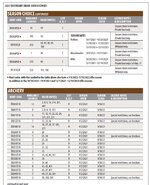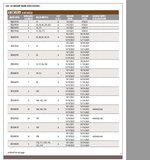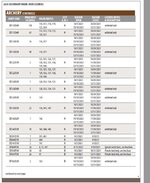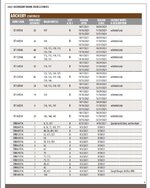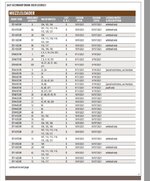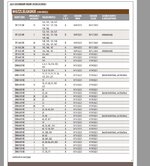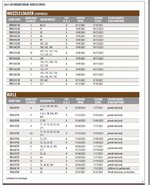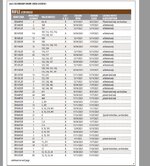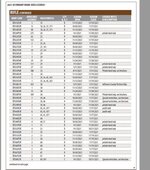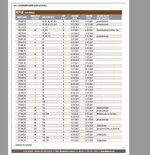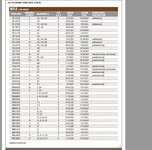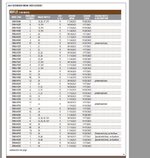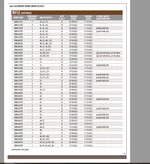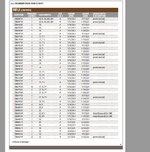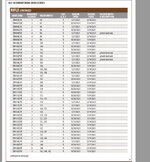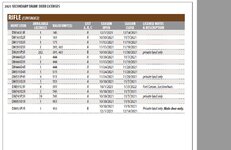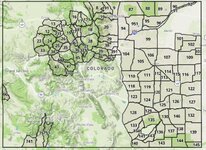Navigation
Install the app
How to install the app on iOS
Follow along with the video below to see how to install our site as a web app on your home screen.
Note: This feature may not be available in some browsers.
More options
Style variation
You are using an out of date browser. It may not display this or other websites correctly.
You should upgrade or use an alternative browser.
You should upgrade or use an alternative browser.
CPW - ‘Righting’ some Wrongs
- Thread starter cnelk
- Start date
Being a Co native and spending lots of time in the mountains the argument that mountain towns rely on NR dollars hasn’t been true for years, our hills are packed 24/7 with recreational users 365 days a year. Also in the last 5 years folks moved in and live full time in a lot of the smaller mountain towns almost all them doing remote work in what used to be blue collar mountain towns. When shacks in kremmling cost 500k they aren’t relying on hunters filling up or buying a bite as much. Plus a lot of NR hunts I know come with camp fully outfitted or backpack so all they buy is maybe some gas and 1 or 2 meals on the way in and out.No I’m not saying you don’t. But to ignore the influx of revenue that NR hunters bring would be ignorant. Obviously residents buy more goods and pay more taxes. I live in a semi “tourist” area and the revenue brought in by NR hunters and fishermen drastically help support tons of small businesses in our area. I’m just saying there has to be a middle ground. I see your concerns and they are relevant. But just because I don’t live in a state shouldn’t keep me from being able to enjoy federal ground and it’s resources in said state. There should be limitations no doubt. What those are? No state seems to have figured that one out yet IMHO.
I stand corrected. I was using my own personal experience in my home area as a basis. The whole “work remotely” things is causing waves everywhere in rural America.Being a Co native and spending lots of time in the mountains the argument that mountain towns rely on NR dollars hasn’t been true for years, our hills are packed 24/7 with recreational users 365 days a year. Also in the last 5 years folks moved in and live full time in a lot of the smaller mountain towns almost all them doing remote work in what used to be blue collar mountain towns. When shacks in kremmling cost 500k they aren’t relying on hunters filling up or buying a bite as much. Plus a lot of NR hunts I know come with camp fully outfitted or backpack so all they buy is maybe some gas and 1 or 2 meals on the way in and out.
fwafwow
WKR
- Joined
- Apr 8, 2018
- Messages
- 6,110
I think @Poser covered it well. To add to it, if the Federal public land is at issue, then it could be said that it’s (1) owned by the entire US citizenry, so that more populated NR states with more citizens effectively own more of it, and/or (2) whatever carrying costs are incurred each year (management, fire fighting, etc. - and maybe even lost opportunity costs) are being born by those who are paying the taxes. Unfortunately this leads me to wonder whether these arguments then go past NR vs residents in a population basis, and then to higher vs lower or zero bracket taxpayers. Do Bezos and Elon have a bigger stake in or right to use public lands?My question is: What precisely are non-residents contributing to in terms of public land, or wildlife?
Yes, there are more of them, and they pay more taxes. But what does that do for anything?
Sent from my Pixel 6 using Tapatalk
Similar points were made, but essentially in the reverse, when the high income tax states were called out for the deductions of state income taxes - meaning that the rest of the country was arguably helping to pay for those residents’ taxes.
Sorry to ramble.
BUT - while I’d love to have easier or better access to tags, I’m a states’ rights guy on this tag allocation change.
ReaptheHeat
WKR
Hey now, it's just a little bigger than a shack!Being a Co native and spending lots of time in the mountains the argument that mountain towns rely on NR dollars hasn’t been true for years, our hills are packed 24/7 with recreational users 365 days a year. Also in the last 5 years folks moved in and live full time in a lot of the smaller mountain towns almost all them doing remote work in what used to be blue collar mountain towns. When shacks in kremmling cost 500k they aren’t relying on hunters filling up or buying a bite as much. Plus a lot of NR hunts I know come with camp fully outfitted or backpack so all they buy is maybe some gas and 1 or 2 meals on the way in and out.
But for real, Kremmling is loaded with million dollar+ homes and ranches in the hills, and along the river.
tdhanses
WKR
- Joined
- Sep 26, 2018
- Messages
- 6,106
Wonder what percentage of those homes/properties are owned by nonresident, seems like in most tourist areas the NR ownership is pretty high and residents complain about rising property taxes due to this and affordability decreasing. There are a ton of second homes in CO.Hey now, it's just a little bigger than a shack!
But for real, Kremmling is loaded with million dollar+ homes and ranches in the hills, and along the river.
But does kremmling have a chick fil-a? Oh wait, wrong thread.Hey now, it's just a little bigger than a shack!
But for real, Kremmling is loaded with million dollar+ homes and ranches in the hills, and along the river.
Billy_Goat
FNG
thanks for the OTC split data, Brad. I updated my spreadsheet.
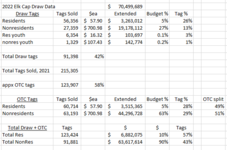
what is clearly true, is that there are alot more folks that want to hunt elk today (both res and non-res) and we'd all like a fun experience when we go. with overall success rates being fairly low, we want access to better country (more elk there) to hunt them in. For sure, no one likes seeing another truck at the trailhead, no matter what license plate is on the bumper.
I do agree that the state has the right to legislate how tags are allocated and what to charge for them. it's supply and demand, no different than the cost of a Big Mac or a gallon of gas. Folks will pay the fee, or they wont get a tag.
the math above does indicate that the cost of res tags would have to rise to keep the overall ~$70M elk tag budget neutral, but I dont think the increase in tag cost would impede sales.

what is clearly true, is that there are alot more folks that want to hunt elk today (both res and non-res) and we'd all like a fun experience when we go. with overall success rates being fairly low, we want access to better country (more elk there) to hunt them in. For sure, no one likes seeing another truck at the trailhead, no matter what license plate is on the bumper.
I do agree that the state has the right to legislate how tags are allocated and what to charge for them. it's supply and demand, no different than the cost of a Big Mac or a gallon of gas. Folks will pay the fee, or they wont get a tag.
the math above does indicate that the cost of res tags would have to rise to keep the overall ~$70M elk tag budget neutral, but I dont think the increase in tag cost would impede sales.
@Billy_Goat
You could also add in the qualifying licenses needed for Res & NonRes [Adult] drawing, as those $$$ also increase the elk budget
You could also add in the qualifying licenses needed for Res & NonRes [Adult] drawing, as those $$$ also increase the elk budget
@Archer86 is right, and its unfortunate so many people overlook this^^^It will make a huge difference they could do a general tag like wyoming and guys will burn points to draw it and limiting the hunters will make for a better hunt and there will not be any left overs guaranteed.
I will hunt wyoming every year so I don't think I will have a issue with hunting decent units every year
End of the day if hunters look at animals as only having value if they can kill them then we have a bigger problem then tag allocation of nr
I spend all kinds of time in the summer with my family in the mountians taking pictures of animals ,camping , fishing , and just enjoying watching animals. If I didn't get a elk tag every year I would still spend time in the mountians I think this is the biggest issue with some nr the animal only has value to them if they can kill it and would otherwise never spend time in that state or the community the claim to support so much with nr dollars
I love hunting and spend the whole year preparing for it but if you asked me about my most memorable times in the mountains, the top of the list is always going to be spending time with my wife, kids, and friends. I'll take those trips over a hunting trip every single time!
Behlftball
Lil-Rokslider
- Joined
- Dec 5, 2020
- Messages
- 151
I don't ever get the non residents complaining about the tag and license fees. There's so much cost to elk hunting and western big game hunting in general as a nonresident. Gas, onx, truck, gear, possibly atv, etc. Almost every non resident I see is decked out in uber expensive camo and a newer model truck. I don't get the fuss in complaining about tag costs.
I'm a nonresident hunter from WI. If a tag goes up $200 that's almost nothing in the grand scheme of what I spend.
I'm a nonresident hunter from WI. If a tag goes up $200 that's almost nothing in the grand scheme of what I spend.
teamwhitebelly
Lil-Rokslider
- Joined
- May 26, 2015
- Messages
- 117
Based off these numbers alone what would be the cost of a resident lisc. if the 90/10 quota was implemented and would equal the monies earned in above graph? My numbers say over 5x the existing cost.thanks for the OTC split data, Brad. I updated my spreadsheet.
View attachment 493252
what is clearly true, is that there are alot more folks that want to hunt elk today (both res and non-res) and we'd all like a fun experience when we go. with overall success rates being fairly low, we want access to better country (more elk there) to hunt them in. For sure, no one likes seeing another truck at the trailhead, no matter what license plate is on the bumper.
I do agree that the state has the right to legislate how tags are allocated and what to charge for them. it's supply and demand, no different than the cost of a Big Mac or a gallon of gas. Folks will pay the fee, or they wont get a tag.
the math above does indicate that the cost of res tags would have to rise to keep the overall ~$70M elk tag budget neutral, but I dont think the increase in tag cost would impede sales.
Amos Moses
WKR
Colorado is going 90/10 now? This is escalating quickly.Based off these numbers alone what would be the cost of a resident lisc. if the 90/10 quota was implemented and would equal the monies earned in above graph? My numbers say over 5x the existing cost.
wind gypsy
"DADDY"
- Joined
- Dec 30, 2014
- Messages
- 12,662
I'll be the contrarian. IMO, the best thing we could do for hunting isn't being more restrictive on access and tags....it is being less restrictive but more consistent between states and providing broader access to larger amounts of national forest and tags. The current bifurcated system of state by state game management on national forests is starting to fail IMO, especially with the introduction of wolves and grizzly, loss of habitat and declining game populations.. Politicians, corporations, outfitters and ranchers have taken control of game management and our licensing and tags in most western states and they have turned our national forests and hunting into the equivalent of state run casino's. The cost keeps going up, along with the odds and the house always wins.
If all the western states made it more consistent and easier to get NR tags....then no one state or area would get inundated with out of state hunters. When you limit the flow of tags and options....you create funnels and right now its called Colorado. If Colorado, Montana, NM. WY etc., created a single and a more fair system for tag allocation in NF that wasn't driven by individual state politicians, outfitters and ranchers, it would allow for more options and less crowding.
At some point the increasing cost, odds and restrictions is going to outweigh the benefit of buying a license and applying for tags at all and there are always going to be unintended consequences...like significantly fewer hunters.....which makes us politically irrelevant at some level and could eventually kill hunting all together in some states.
Attacking or blaming NR hunters for over crowding and pressuring state politicians to limit local level access is a short term approach playing right into the hands of those among us who want to end hunting and gun ownership all together. NR hunters are going where they are being funneled....not necessarily where they want to.
Forest through the trees....divide and conquer.....take your pick but blaming other hunters for over crowding or making hunting so expensive and restrictive that it becomes reserved for the elite or unobtainable for most isn't much of a solution to me....regardless of which state you call home.
If all these other states had a lack of elk hunters and all kinds of open public land that supported increased pressure I could see something agreeable here. That's not the case.
I’ve said it a bunch of times but for 1 min all the NR need to put themselves in a Res shoes. Imagine you couldn’t hunt deer in your home state because guys from across the country were going to come hunt every year. Would you sit back and take it? Or would you fight to be able to hunt deer in your state every year? Come on be honest it’s not that tough.
MallardSX2
WKR
- Joined
- Feb 24, 2016
- Messages
- 3,224
MallardSX2
WKR
- Joined
- Feb 24, 2016
- Messages
- 3,224
You literally just posted the “youth” draw
MallardSX2
WKR
- Joined
- Feb 24, 2016
- Messages
- 3,224
Similar threads
- Replies
- 21
- Views
- 670
- Replies
- 66
- Views
- 6K
Featured Video
Latest Articles
- TT#64 Josh Boyd Elk Hunting Strategies for Every Season
- Aaron Davidson of Gunwerks
- TT#63 Dirk Durham’s Art of Elk Calling
- BIG Buck Stories with the Dirty Giants Podcast
- TT#62 Brian Barney Hunting Bulls without Calling
- Hoyt Alpha AX-2 SD Review
- Kuiu Kenai vs Outdoor Vitals Vario Hooded Jacket Review
- Hoyt RX-9 Ultra Review
- Hunting Vampire Bucks & Building an Optics Kit
- Darton Sequel ST2 35 Review

